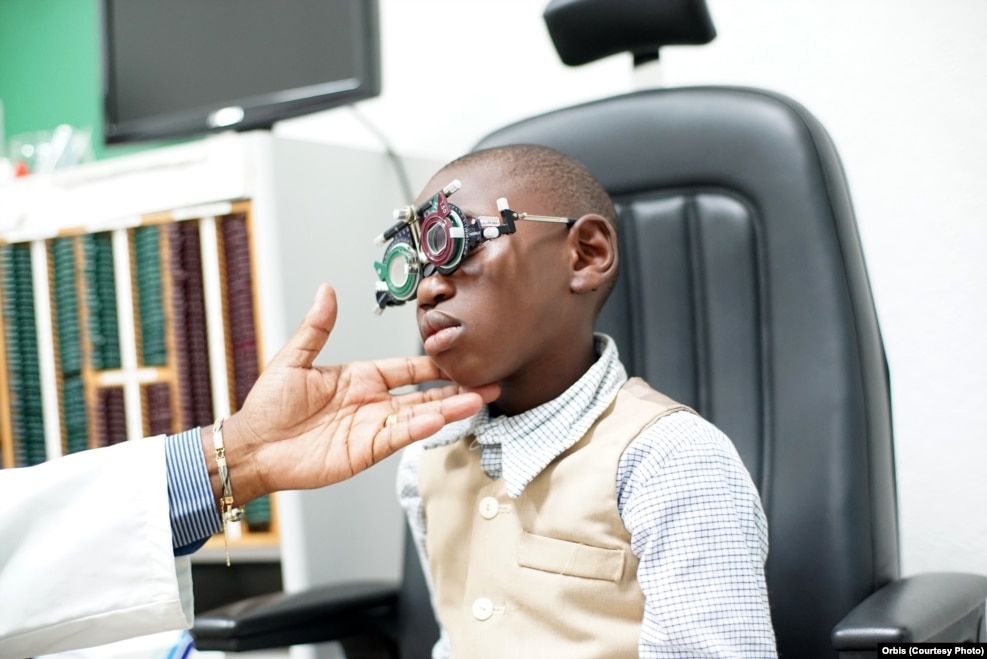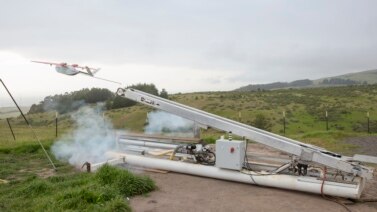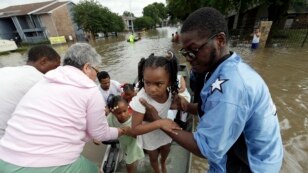
Many of the 285 million people who have vision problems live in low-income countries, according to the World Health Organization. The WHO says most people with vision problems could be helped or cured - but only if they can get the right treatment.
Enter Orbis and its flying eye hospital. The nonprofit organization has a plane that is also a state-of-the-art eye clinic. The plane allows medical workers to perform vision screenings and operations around the world.
Orbis has the world's only flying eye hospital. This June, it introduced its latest model, a MD-10 airplane donated by the FedEx company.
It is the third version of the flying eye hospital.
Dan Neely of the Indiana School of Medicine is a volunteer doctor for Orbis. He has traveled to Jamaica, Southeast Asia and Africa on the new plane. He says this plane has all the newest technology. Some facilities on the ground do not.
“You can be in Zambia and the power goes out in the middle of the surgery,” Neely said. “You can be there needing to scrub your hands for the surgery and you have to use a bucket of water because the water's gone out.”
The CEO of Orbis is Bob Ranck. Ranck is a retired U.S. Air Force brigadier general.
Ranck explained that the new plane also includes a classroom. Orbis uses the room to train doctors and nurses in the countries where it lands. He said Orbis teaches local health care providers to make it a priority to reduce cases of blindness.
Gary Dyson is a pilot who usually flies cargo planes for FedEx. But he volunteers flying time for Orbis.
"When you see a child who can't see on Monday and they can see on Wednesday, you're hooked," Dyson said.
The change in a patient's life after surgery can be dramatic, said Rosalind Stevens. Stevens is a volunteer doctor from the Geisel School of Medicine at Dartmouth College.
“When we remove the patch the next day, the patient breaks into a big smile,” she said.
The newest version of the flying hospital will make flights to a few cities in the United States. Then it will provide a medical program in China in September.
Orbis also operates programs in Cameroon, Ethiopia, Ghana, China, Vietnam, India, Bangladesh, Indonesia and Latin America.
I'm John Russell.
Mike O'Sullivan wrote this story for VOA News. Jim Dresbach adapted it for Learning English and VOANews.com. Kelly Jean Kelly was the editor.
We want to hear from you. Write to us in the Comments Section or visit our Facebook page.
Words in This Story
vision - n. the ability to see: sight or eyesight
state-of-the-art - adj. using or having the most modern methods, knowledge, or technology
clinic - n. a place where people get medical help
facility - n. something (such as a building or large piece of equipment) that is built for a specific purpose
scrub - v. to rub (something) hard with a rough object or substance and often with soap in order to clean it
bucket - n. an open container with a handle that is used especially to hold and carry water and other liquids
priority - n. something that is more important than other things and that needs to be done or dealt with first
blindness - n. the inability to see
cargo - n. something that is carried from one place to another by boat, airplane, etc.
screening - n. the act of doing a test on a person or a person's blood, urine or sight to look for evidence of a disease
hooked - v. to become connected to something
dramatic - adj. sudden and extreme
patch - n. a piece of material that is worn over your eye because of injury or for medical reasons

